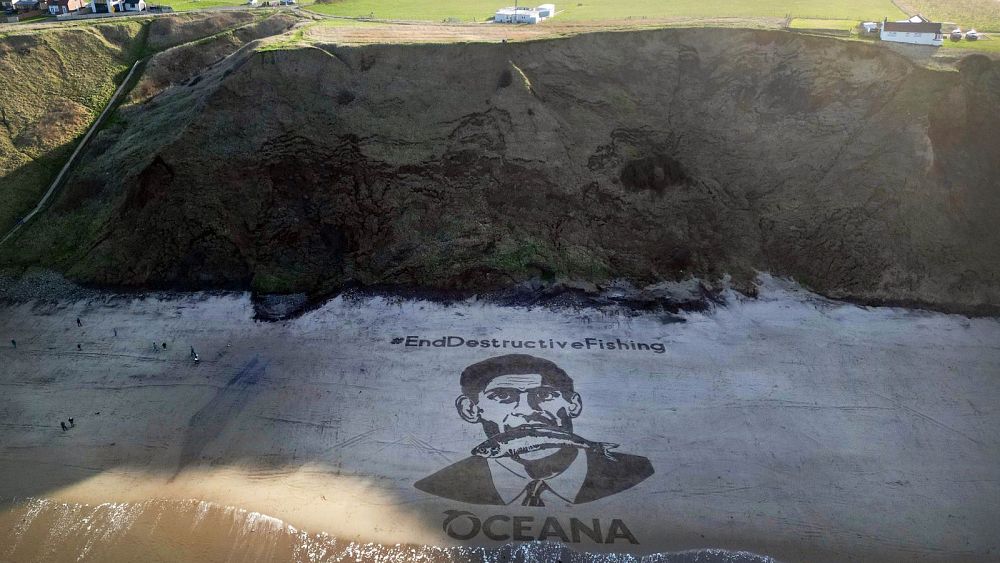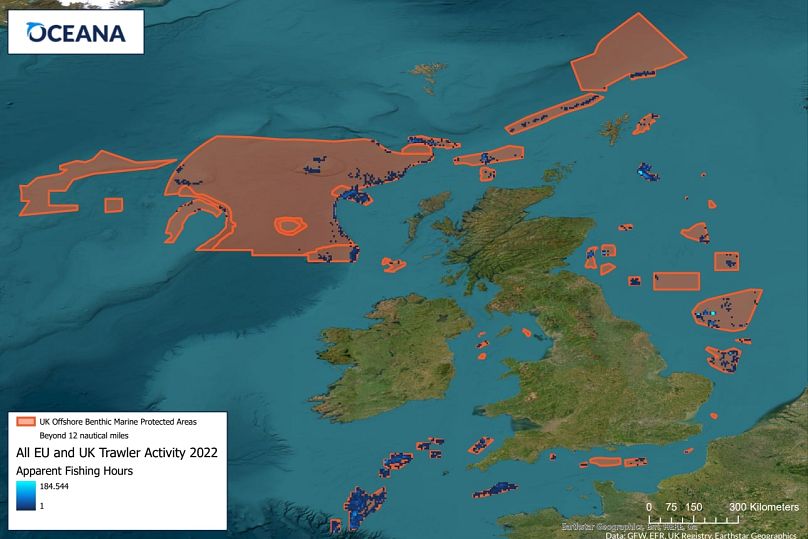
Sensitive marine ecosystems were subjected to over 136,000 hours of industrial fishing last year, according to Oceana’s scrutiny of UK waters.
The ocean conservation NGO says that at least 7,000 of these hours involved the use of destructive bottom-towed fishing gear in Marine Protected Areas (MPAs).
Its analysis is based on data collected from Global Fishing Watch (GFW), a global nonprofit which detects ‘apparent fishing effort’ using satellite information on the movement of vessels. This makes it hard to calculate the exact extent of fishing, but Oceana estimates it adds up to 15 years worth of negative impact in supposedly protected parts of the sea.
Hugo Tagholm
Executive director of Oceana UK
“The attack on ocean life must end,” Hugo Tagholm, executive director of Oceana UK said today (2 March) as UK ministers attend the ‘Our Ocean’ conference in Panama.
“As a minimum, we need to stop destructive fishing in marine protected areas and end the public deceit that these regions are safeguarded from industrial exploitation. We cannot stand for this bluewash any longer.”
Looking at the GFW data alongside European and UK registries of fishing gear types, the NGO found that almost 1,000 EU and UK boats appeared to be active in MPAs in 2022.
The estimated time spent appearing to fish by these vessels in these zones has increased by over 4,000 hours compared to 2021.
How are Marine Protected Areas protected in the UK?
Ocean campaigners have questioned the legality of the UK government’s approach to its MPAs.
There are 374 areas of UK seas afforded this status, which is designed to protect rare, threatened and important habitats and species from damage caused by human activities.
But bottom trawling is only banned in four offshore MPAs, including Dogger Bank (which holds the largest shallow sandbank in British waters) and South Dorset.
The NGO considers the issuing of fishing licences which permit bottom trawling or other industrial fishing in MPAs to be in breach of the country’s nature laws, including the Offshore Habitats Regulations, Marine Act and Fisheries Act.

Tagholm says the research “makes a mockery” of the UK’s commitment to protecting 30 per cent of oceans by 2030, agreed at the biodiversity conference COP15 in December 2022.
In January 2023, the government’s environment department (DEFRA) announced plans to ban harmful fishing activity in 13 more MPAs. But campaigners say the new byelaws will only protect reef features, where trawling is unlikely to occur.
DEFRA has also said that all 40 English offshore MPAs will be covered by 2024.
What impact does bottom trawling have?
Bottom trawling and dredging involve the towing of heavy gear along the seabed, which often destroys the habitats and the species that live there.
Dr Emma Sheehan, associate professor of marine ecology at the University of Plymouth, explains why these habitats are so important.
“These areas act as important nursery and feeding areas for essential marine life, including endangered species. The seabed also provides important ecological and environmental functions: filtering water, binding sediments and capturing carbon,” she says.
Sheehan believes we need to urgently expand and enforce the protection of these habitats.
“My research at Lyme Bay, one of the UK’s largest Marine Protected Areas, where bottom trawling was banned, has demonstrated the incredible capacity for reef recovery and resilience when we protect these ecosystems.”
The UK public support a bottom trawling ban
Oceana UK also commissioned a survey to capture the public feeling towards MPAs and bottom trawling.
One-third of Brits have never heard of the term ‘bottom trawling’, the polling by Opinium Research indicates. Upon learning about the practice, 76 per cent of UK adults said it should be banned in MPAs. The same proportion agreed that the government is failing to protect marine life.
To express people’s discontent, Oceana UK commissioned a striking work of sand art. It depicts Prime Minister Rishi Sunak with a fish in his mouth alongside a call to ‘End Destructive Fishing’.
The artwork was etched into Cayton Bay in Scarborough. It is close to the Holderness Offshore MPA and Markham’s Triangle MPA which are yet to be protected from bottom trawling, but also Dogger Bank MPA, to highlight the contrast that adequate protections can make.
